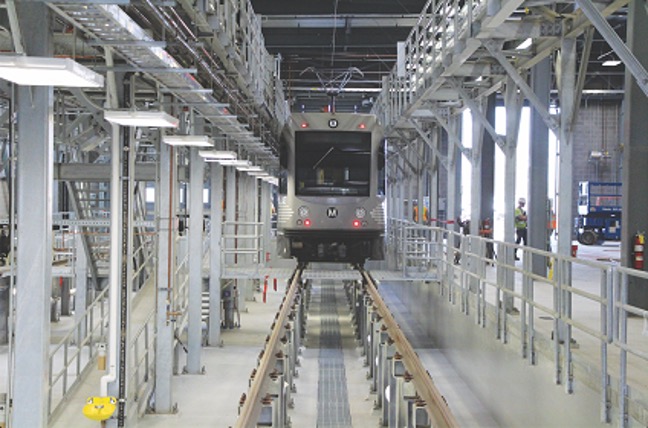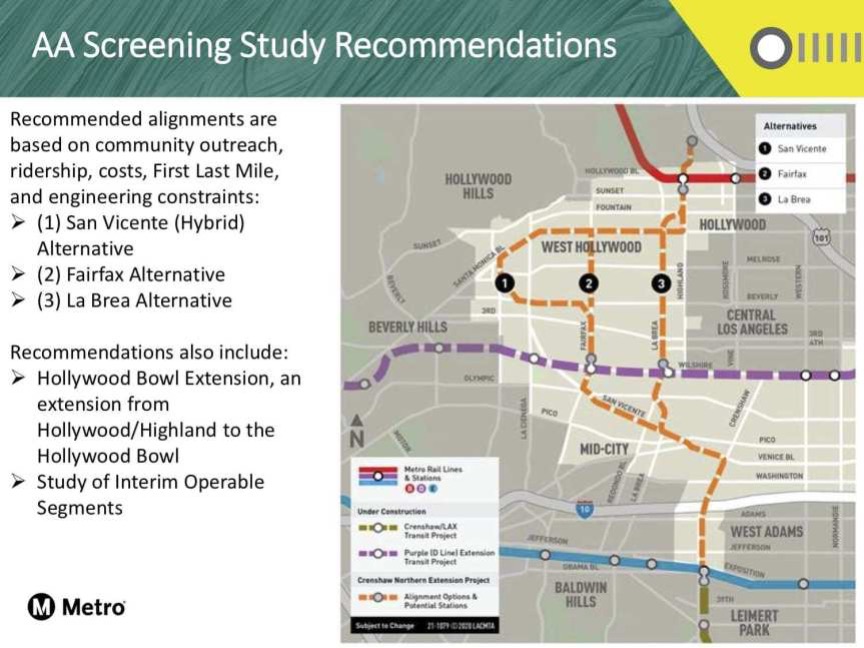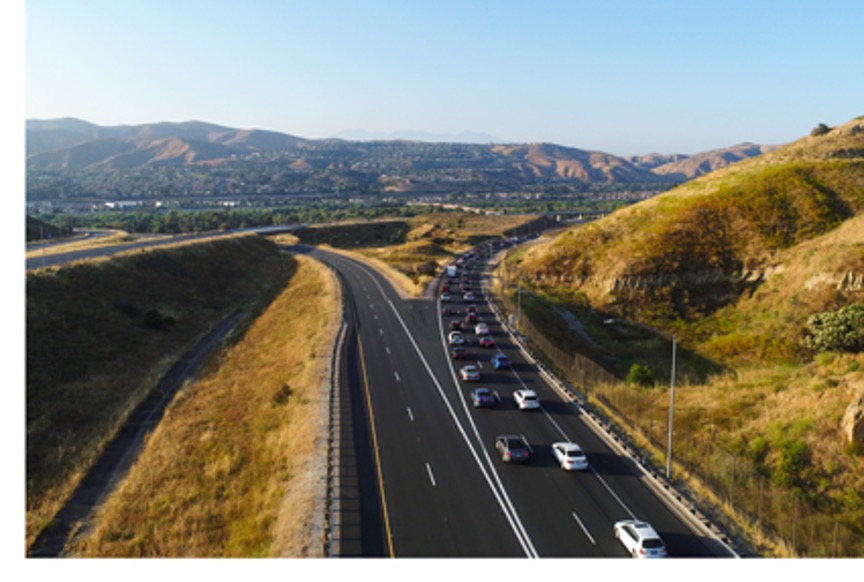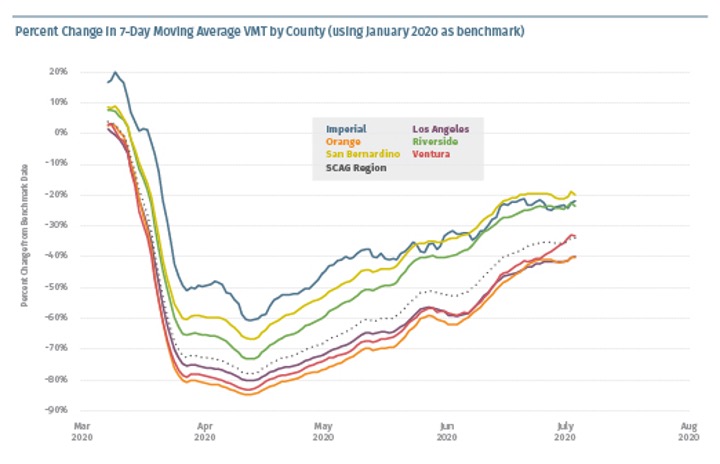
Mobility 21 Summit Advance
Registration Closes This Friday!
This Friday is the cutoff to register for the Virtual Summit and receive a Bento Box,* conference bag and program mailed to your office or home (while supplies last)! *Depending on ticket eligibility.
Closing Session Highlight:
CEO ROUNDTABLE: EQUITY AND RECOVERY
Mobility 21 is pleased to announce our Closing Session CEO Roundtable: Equity and Recovery. Please join us virtually on Friday, Sept. 18 for this panel discussion with the leading transportation executives of Southern California who will share how they are dealing with the intertwined issues of equity and recovery during the ongoing emergency and throughout the coming year.
 Closing Session Moderator:
Closing Session Moderator:
Charles T. Brown, MPA, CPD, LCI
Senior Researcher, Alan M. Voorhees Transportation Center and Adjunct Professor, Edward J. Bloustein School of Planning and Public Policy, Rutgers, The State University of New Jersey
Agenda:
Thursday, Sept. 17, 2020
(9:00 AM – 12:00 PM – Expo Hall Open)
9:00 AM – 9:30 AM – Opening General Session
9:30 AM – 10:30 AM – Breakout Sessions
1: CHAIRMANS’ ROUNDTABLE: STEPPING UP TO 2020’S CHALLENGES
2: OPEN MIC ON MOBILITY: ZOOMERS AND MILLENNIALS
3: TECHNOLOGY NOW!
4: RESILIENCY MATTERS
10:30 AM – 11:00 AM – Luncheon General Session
Friday, Sept. 18, 2020
(9:00 AM – 12:00 PM – Expo Hall Open)
9:00 AM – 10:00 AM – Breakout Sessions
5: WHAT’S THE NEW NORMAL: A STATE AND FEDERAL POLICY DISCUSSION
6: MOVING GOODS IN CORONA-TIMES
7: LET’S TALK REVENUE
8: A BUILDER’S VISION POST-COVID-19
10:00 AM – 11:00 AM – Closing General Session
Registration:
Late Registration: $325 (closes Friday, Sept. 4)
Student/Military Personnel: $165
Full-Summit registration is $350 after Sept. 4 and delivery of Summit Bento Box, conference bag and program is not guaranteed.
Mobility 21 Advisory Board Member Spotlight:
Sarah Catz
Executive Director
Center for Urban Infrastructure
 Sarah L. Catz is the Director of the Center for Urban Infrastructure at Brandman University – Chapman University System and a Researcher in the Institute of Transportation Studies at University of California, Irvine. She joined the Mobility 21 Advisory Board in 2015.
Sarah L. Catz is the Director of the Center for Urban Infrastructure at Brandman University – Chapman University System and a Researcher in the Institute of Transportation Studies at University of California, Irvine. She joined the Mobility 21 Advisory Board in 2015.
During the past two decades, Sarah has been a leading transportation/infrastructure and public policy expert and has played a key role in critical transportation and infrastructure projects, both at the local and state levels. She has served as the state’s acting Deputy Secretary of Transportation as well as the project manager for The Commission on Building for the 21st Century, a California infrastructure commission that included projects within water, transportation, housing, facilities and technology areas. While with the state of California, Catz also helped secure state funding for critical infrastructure projects, including major rail projects in Southern California.
Sarah spent 10 years on the Board of Directors of the Orange County Transportation Authority and served as Chairman of the Board, and was a founding member and two-term chairperson of the Board of Directors of Southern California Regional Rail Authority (Metrolink). Sarah is a past chair of the Orange County Forum, a nonpartisan current affairs organization convening the Orange County civic community to exchange ideas, and discuss public policy issues with distinguished speakers and national leaders.
Sarah recently joined Vectis Strategies, a national public relations and public affairs firm, as Senior Partner. Prior to joining Vectis, Sarah was Vice Chancellor of External Affairs at Brandman University-Chapman University System with responsibility for community and government relations as well as advancement and alumni relations. She has also been a partner in a national law firm and operated her own public affairs consulting practice.
Sarah has been recognized by The League of Women Voters of Orange County with the “OC Woman of Achievement” Award and by OC Metro Magazine as one of “10 Women Making a Difference in Orange County.” She also is the recipient of the California Transportation Foundation Tranny Award for “Citizen of the Year” and has been named “Woman of the Year” three times by the Orange County Chapter of WTS.
Sarah received her law degree from the University of Santa Clara and her bachelor’s degree from George Washington University.
Mobility 21 Advisory Board Member Spotlight:
Joe Toolson
Senior Vice President and South West Area Regional Manager
Mott MacDonald
 M. Joseph Toolson is currently Senior Vice President and South West Area Regional Manager for Mott MacDonald (MM). As a part of this international full-service engineering organization of over 16,000 employees world-wide, he brings expertise in Rail and Transit, Highways and Bridges, Utilities, Airports, and transportation program systems delivery. He is a student of project implementation in completing a Bachelor of Science Degree in Civil Engineering with an emphasis in Structural Engineering from San Jose State University in 1988. He has furthered his education through international training at MM.
M. Joseph Toolson is currently Senior Vice President and South West Area Regional Manager for Mott MacDonald (MM). As a part of this international full-service engineering organization of over 16,000 employees world-wide, he brings expertise in Rail and Transit, Highways and Bridges, Utilities, Airports, and transportation program systems delivery. He is a student of project implementation in completing a Bachelor of Science Degree in Civil Engineering with an emphasis in Structural Engineering from San Jose State University in 1988. He has furthered his education through international training at MM.
Throughout his 30-year career, he has focused in different sectors of transportation from planning, engineering, and environmental, to design, and construction implementation, and claims. He has a firm understanding of the issues which surround project delivery specifically in transportation infrastructure which he has learned from his participation with multiple self-help county programs starting with the original Measure A in Santa Clara County legislated to improve regional transportation. Along with this program in Santa Clara, he has supported the project delivery teams associated with many other transportation improvement programs throughout the State of California such as those in Alameda, San Bernardino, San Diego, and Orange Counties.
Aside from fulfilling his role as a South West Regional Manager for MM, Mr. Toolson has also served many major regional projects including the OC Bridges grade separations, SR-22 Design-Build, and I-405 Improvement Project as a technical consultant lead for the Orange County Transportation Authority. Mr. Toolson’s past roles have also included serving as a practice lead for MM for Highways and Bridges and Deputy Practice Lead for the Program Management practice.
Arcadis is providing Project Management and Construction Management Services for LA Metro’s award-winning Regional Connector project.
Summit Titanium Sponsor Spotlight
Parsons
![]() Delivering A Better World –
Delivering A Better World –
From A Distance
In the 75 years since Ralph M. Parsons founded our company, the world has seen many exciting breakthroughs and advancements and, sadly, some periods of great uncertainty. Now is one of those uncertain times, when we are reminded that the true measure of humankind is not our response in times of normalcy but how we rise to the challenge in times of adversity.
When the governor of California issued stay-at-home orders in March, our Southern California clients were naturally concerned about their projects. We ensured that each client had the needed documentation to prove the critical nature of their project so construction could continue with added safety measures in place. In addition to routine precautions (e.g., wearing face coverings), we increased office space in our field offices to maintain safe physical distancing, identified major equipment deliveries impacted by lockdown in other parts of the world to minimize project delays, and we took advantage of technology and human ingenuity to perform inspections and testing remotely or virtually.
We care deeply about the health and safety of our team, partners, and customers during the pandemic, and we remain more committed than ever to our corporate purpose of delivering a better world—even if we have to deliver it from a distance.
Three Routes Recommended for Further Study on Crenshaw Northern Extension Project
The Metro Board of Directors this month will consider advancing three possible routes for the Crenshaw Northern Extension project, as well as a $50.3-million contract for environmental analysis and advanced conceptual engineering of the project.
The three routes are shown on the map above and here’s the Metro staff report. Five potential routes were studied in the project’s Feasibility/Alternatives Study that was released in 2018. After further analysis and public review, the three routes recommended for further study were identified as the ones that had the most public support, highest potential ridership and were the most practical and cost effective.
A potential extension from Hollywood/Highland Station to the Hollywood Bowl will also be studied. The Bowl is about a one mile walk from the current Red Line station. Getting rail transit to the Bowl has long been talked about but has proven difficult due to the high cost of building transit to a destination that certainly gets big crowds — but only so many nights of the year.
For those new to this project, the 8.5-mile Crenshaw/LAX Transit Project is currently being constructed between the C Line (Green) and the E Line (Expo). The Crenshaw Northern Extension would continue the Crenshaw/LAX Line to the north to a transfer point with the Purple Line subway and then continue to the Red Line subway in Hollywood. Here’s the project homepage on metro.net.
In addition to forging faster transit connections between communities south and north of the 10, the project could also serve busy job and commerce centers north of the 10 freeway, including the Wilshire Corridor, West Hollywood and Hollywood. Early ridership estimates for all the routes were very promising, showing about 90,000 boardings being taken on the line on weekdays.
The Measure M spending plan provides about $2.2 billion for the project, although early cost estimates show that the expected cost could be significantly more due to expected tunneling and bridges that could be needed. Under Measure M, the project is scheduled to be built in the 2040s. But Metro — in partnership with the city of West Hollywood and the city of Los Angeles — is advancing planning work on two key conditions: 1) that funding can be found to accelerate the project, and; 2) that accelerating the project would not impact the timelines of other Measure M projects, as per Metro’s project acceleration policy.
It’s worth noting that although the analysis and engineering contract being considered by the Metro Board is for $50.3 million, only $2.2 million of that would be spent in fiscal year 2021 in order to contain costs during the ongoing coronavirus pandemic. If approved, the contract will be awarded once the Board approves a budget for Metro for the current fiscal year (that’s scheduled to happen in September). As some readers know, Metro pushed back its budget approval from May to September in order to reflect costs related to the ongoing pandemic.
Employees at the Naval Weapons Station Seal Beach get a first look at a Tesla X, the first all-electric vehicle in OCTA’s Vanpool Program. In addition, the OCTA board approved in August the replacement of up to 55 transit support vehicles that run on compressed natural gas with all-electric vehicles, furthering OCTA’s goal of transitioning to a zero-emission fleet.
OCTA Adds All-Electric Support Vehicles to Fleet
The Orange County Transportation Authority took two more important steps this month in the agency’s transition to zero-emission vehicles.
The OCTA Board of Directors approved the purchase of up to 55 battery-electric vehicles that will support bus operations in the field.
And the doors to a Tesla Model X SUV swung open for the first time to five long-distance commuters, making it the first all-electric vehicle in OCTA’s Vanpool program.
The board vote will replace up to 55 existing light-duty vehicles, which run on compressed natural gas (CNG) and are at the end of their scheduled lifespan, with the all-electric zero-emission vehicles.
“These are important steps for OCTA as we continue to provide safe, efficient and reliable vehicles that also take into consideration how to best protect our environment,” said OCTA Chairman Steve Jones, also the Mayor of Garden Grove.
The support vehicles will primarily be used to relieve coach operators on duty in the field.
Although a bus driver may work a shift of eight to 10 hours, the bus may remain in service up to 22 hours a day, requiring a new driver to meet the bus in route.
The board’s action to expedite the purchase of the vehicles helps take advantage of factory incentives that are expiring, helping save up to $55,000 overall.
The Tesla X for the OCTA Vanpool program is provided by Green Commuter, one of three vanpool companies contracted by OCTA to provide vehicles to commuters in Orange County to help them share the ride as they commute to work.
The all-electric vanpool vehicle is being used by five employees who work in Seal Beach at the Naval Weapons Station. They commute approximately 140 miles roundtrip each day from near Murrieta in southern Riverside County. For more information about starting a vanpool, visit www.octa.net/vanpool.
OCTA has taken several important steps this year to convert to zero-emission technology for a balanced and sustainable transportation future.
In January, OCTA debuted 10 new hydrogen fuel-cell electric buses, along with the nation’s largest hydrogen fueling station at its Santa Ana Bus Base. In April, the OCTA Board of Directors approved a request for quotes to purchase 10 plug-in battery-electric buses.
Then in June, the board approved a draft plan outlining how the agency will convert the OC Bus fleet to 100 percent zero-emission technology over the next 20 years.
The effort aligns with California’s Innovative Clean Transit Rule, a first-of-its kind regulation in the U.S. that sets a goal for public transit agencies to gradually transition to 100 percent zero-emission bus fleets by 2040.
241/91 Express Connector Project Enters Final
Design Phase, Marking Important Project Milestone
The Foothill/Eastern Transportation Corridor Agency (F/ETCA) Board of Directors has advanced the contracted engineering work to complete the 241/91 Express Connector Project’s final design phase. The phase is anticipated to last until 2022, with construction expected to commence in 2023 and completion scheduled for 2025.
The 241/91 Express Connector will be a direct flyover ramp from the northbound 241 Toll Road to the eastbound 91 Express Lanes and from the westbound 91 Express Lanes to the southbound 241 Toll Road. The connector will provide improved connectivity between the 91 Express Lanes and the 241 Toll Road and will enhance traffic operations for State Route 91’s general purpose lanes and the northbound 241 Toll Road.
During the final design phase of a project, detailed plans, specifications and estimates are prepared so that a project can be bid and advanced into the construction phase.
“This project is going to make a huge difference for commuters in the region. I’m so pleased with the work that’s been done to move this effort forward and to see the project enter the next phase toward construction, which will create 2,250 jobs,” said Christina Shea, F/ETCA Chairwoman and Mayor of Irvine.
The F/ETCA is working in partnership with the California Department of Transportation (Caltrans), the Orange County Transportation Authority (OCTA) and Riverside County Transportation Authority (RCTC) on the 241/91 Express Connector Project. The project’s total estimated cost is $250 million and the F/ETCA is expecting to continue funding the project through completion with its unrestricted cash.
The project and partnership is part of suite of planned improvements in the area including the 15/91 Express Lanes Connector, State Route 91 Corridor Operations Project and the 71/91 Interchange Project.
Initial build-out of The Toll Road system (including the 241 Toll Road) was completed in the late 1990s. In 1994, the 241/91 Express Connector Project was approved as an identified and anticipated future improvement project.
RCTC Reminds Motorists,
“Don’t Go There: Crews Still at Work”
Miles of fresh pavement fill the median of Interstate 15 in Jurupa Valley, Eastvale, Norco, and Corona. Lanes are striped, sound walls are built, lights are up, and tolling equipment is in place. To most drivers, the new 15 Express Lanes look ready to use – but they are not.
The Riverside County Transportation Commission, the lead agency for the design, construction, and operation of the 15 Express Lanes, is working with its construction contractor to complete remaining items along the 15-mile corridor. These “punch-list” items will take time to complete, and crews will remain on site. RCTC also will begin testing its tolling system this month. Testing the equipment will take several months, followed by system adjustments to prepare the lanes to open late this year.
While these last few months of work are under way, RCTC is cautioning drivers, “Don’t Go There: Crews Still at Work,” using this public education tool to keep drivers from the lanes before they officially open to customers.
“The 15 Express Lanes may look ready, but our essential workers are still hard at work, night and day,” said RCTC Chair Ben J. Benoit. “This is still an active construction site. Don’t place the lives of our crews in danger by illegally using these lanes before they are open.”
Orange barrels currently separate the 15 Express Lanes from the general-purpose lanes, and multiple signs along the shoulder note that the lanes are closed. Drivers who trespass in the lanes can receive a CHP citation, and fines are doubled in construction zones.
As the lanes approach opening day toward the end of the year – schedule and weather permitting – RCTC will provide additional information on how to open an account, toll rates, and where to enter and exit the 15 Express Lanes.
Percent change in 7-day moving average VMT by county (using January 2020 as a benchmark). Source: Streetlight Data.
Snapshot of COVID-19 Transportation
Impacts in the SCAG Region
In a new study published, SCAG provides the first comprehensive analysis of the coronavirus’ impact on planes, trains and automobiles in Southern California. The assessment points to a significant decline in vehicle traffic, transit use and air travel since the start of the COVID-19 pandemic.
The study analyzed roadway, rail and air traffic in the six-county region during the early months of the pandemic. SCAG will continue to monitor and report on these trends over the coming months as the economy reopens and the region shows signs of recovery. Some of the short-term impacts of COVID-19 on the SCAG region’s transportation system include:
- Vehicle-miles traveled (VMT) fell by nearly 80 percent in April from January 2020, with the sharpest declines in Los Angeles, Orange and Ventura counties. VMT gradually increased beginning in mid-April as many businesses and public spaces started reopening. Total VMT is now nearing pre-pandemic levels.
- Transit ridership began dropping in March and fell sharply the following month – down 65 percent to 85 percent from prior year. Bus ridership was down 72 percent in April, with Orange County showing the steepest decline (80 percent). On the rail side, LA Metro reported a 68 percent drop in April, rebounding slightly in May (down 63 percent from prior year). The impact on Metrolink ridership was more dramatic – down 90 percent in April and May from the year before.
- Air travel suffered immediate and significant impacts – down 65 percent year-over-year in March and 95 percent in April.
- Freight traffic experienced mixed results, with the San Pedro Bay ports seeing double-digit declines in containerized cargo due to the lockdown of China’s economy, while Ontario International Airport has experienced consistent 20 percent-plus increases in air cargo traffic as a result of a surge in online shopping. Roughly one-third of all jobs and economic activity in the six counties is connected – directly or indirectly – to goods movement.
- The report and its findings have also received media coverage, including pieces in CBS Los Angeles and Progressive Railroading. The full report is available for download on SCAG’s website.






